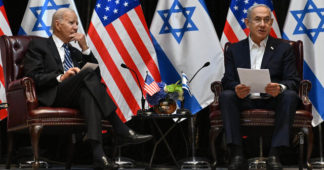By John Hudson
Aug 21, 2025
Shahed Ghoreishi recommended expressing condolences for slain journalists in Gaza and opposing the forced displacement of Palestinians, according to documents reviewed by The Post. He was fired days later.
Monday’s firing occurred days after an internal debate about releasing a statement to the news media that said, “We do not support forced displacement of Palestinians in Gaza.”
Shahed Ghoreishi drafted the line, which resembled previous remarks made by President Donald Trump and Middle East special envoy Steve Witkoff, who said in February that the United States would not pursue an “eviction plan” for Gaza. State Department leadership vetoed the move, instructing officials to “cut the line marked in red and clear,” according to a memo dated last week.
U.S. officials said Ghoreishi’s firing has sent a chilling message to State Department employees that communication straying from ardent pro-Israel messaging — even if it’s in line with long-standing U.S. policy — will not be tolerated. The officials spoke on the condition of anonymity to discuss internal matters.
The State Department did not offer a rationale for Ghoreishi’s firing. “We do not comment on leaked emails or allegations,” State Department spokesperson Tommy Pigott said. “The Department has zero tolerance for employees who commit misconduct by leaking. … Federal employees should never put their personal political ideologies ahead of the duly elected president’s agenda.”
Ghoreishi told The Post he was not given an explanation for his firing, which the State Department was not required to provide due to his status as a contractor. He said the incident raised troubling questions about the department’s position on the potential expulsion of Palestinians from Gaza.
“Despite a strong reputation and close working relationship with many of my colleagues, I was unable to survive these disputes,” he said, noting the language he recommended for the media statement had been previously cleared by the State Department since Trump took office on Jan. 20.
Another dispute inside the State Department occurred earlier this month following Israel’s targeted killing of Al Jazeera journalist Anas al-Sharif and several other journalists in Gaza City.
Israel claimed al-Sharif was a Hamas member, a charge denied by Al Jazeera. Israel has not made similar claims about the cameraman and other journalists killed alongside al-Sharif.
As officials contemplated how the State Department should address the incident, Ghoreishi recommended including a line that said, “We mourn the loss of journalists and express condolences to their families.” State Department leadership objected in an email sent Aug. 10. “No response is needed,” the email said. “We can’t be sending out condolences if we are unsure of this individual’s actions.”
A key opponent of Ghoreishi within the department was David Milstein, a senior adviser to Mike Huckabee, the U.S. ambassador to Israel. Milstein is known for confronting staff throughout the department in defense of the Israeli government, officials familiar with the matter said.
Critics of Milstein within the State Department contend he appears overly eager to please Israeli officials and frequently involves himself in matters that are beyond the scope of his responsibilities. “Milstein is an adviser to an ambassador,” one official said. “That’s it, yet he has his hands in everything.”
Milstein did not respond to a request for comment. Pigott condemned criticisms of Milstein and called him a “valued advocate for the policies of the Trump Administration and for the American people.”
Milstein and other State Department officials clashed in July when Milstein sought to release a statement under Secretary of State Marco Rubio’s name that condemned Ireland for considering legislation that would ban trade with illegal Israeli settlements in the West Bank, officials said. The effort alarmed U.S. diplomats in Europe, who viewed the appropriate next step to be consulting with Irish officials in private before publicly condemning the country’s actions. Ultimately, U.S. diplomats overseeing Europe and the Middle East prevailed over Milstein and prevented the statement’s release.
More recently, Milstein and Ghoreishi disagreed over Milstein’s push for the State Department to refer to the West Bank as “Judea and Samaria,” the biblical name for the region that is widely used within Israel. The territory is internationally recognized as the West Bank, and Palestinians object to the use of Judea and Samaria as legitimizing Israeli settlements and potential annexation — a concern shared by advocates of a two-state solution.
A Milstein memo reviewed by The Post was drafted in response to questions from the Associated Press about House Speaker Mike Johnson’s visit to the territory. The memo praised Johnson (R-Louisiana) for “making history as the highest-ranking U.S. official and first speaker of the House to ever go to Judea and Samaria.”
Ghoreishi managed to cut that line before it was shared with the news media and inserted previously approved State Department language that used “West Bank” while referring other questions about Johnson’s trip to his “office for further information,” the line said.
The question about displacement from Gaza is particularly relevant given reports that Israeli officials are in talks with South Sudan about relocating thousands of Palestinians to the war-torn African nation. Critics say the plan, if implemented, would amount to ethnic cleansing and a war crime. Israeli officials say the plan would amount to “voluntary migration,” a characterization challenged by those noting the besieged enclave’s chronic lack of food and water and the sustained Israeli military campaign.
Ghoreishi’s supporters in the department rebutted spokesman Pigott’s suggestion that he worked against Trump’s agenda. One State Department official said Ghoreishi always cleared his recommendations internally and had a “proven track record of being able to channel President Trump and Rubio in the public talking points” and noted that, “He’s the guy who wrote the Secretary’s tweet ‘Make Gaza Beautiful Again.’”
Ghoreishi said he was not motivated by anti-Trump animus and had been inspired by Trump’s May speech about the Middle East, which he said some senior State Department officials continued to resist.
“Trump called out neocons and Western interventionists for failing the Middle East, and claimed he wanted to help pave a new path for the region,” he said. “The hawks on the seventh floor of the State Department do not match that vision.”
The department’s seventh floor houses Rubio’s office and those of other top officials.
On Wednesday, Ghoreishi came under attack from Laura Loomer, a far-right activist and unofficial adviser to Trump with a track record of leveling unsubstantiated claims. In a post on social media, she called Ghoreishi a “Pro-Iranian Regime Jihadi Muslim Tied To NIAC,” a reference to the National Iranian American Council, a group that supported the 2015 Iran nuclear deal.
Ghoreishi said he was an intern there in the fall of 2013.
Published by Washington Post
We remind our readers that publication of articles on our site does not mean that we agree with what is written. Our policy is to publish anything which we consider of interest, so as to assist our readers in forming their opinions. Sometimes we even publish articles with which we totally disagree, since we believe it is important for our readers to be informed on as wide a spectrum of views as possible.











